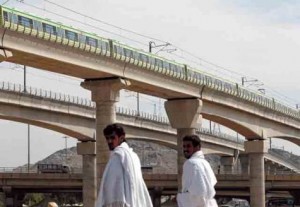By Peter Shaw-Smith, Financial Times www.gulfnews.com
Finance Ministry-level approvals at GCC summit next month could set the ball rolling for 2,200-km link between Kuwait City and Muscat.

Dubai: Next month, the six members of the Gulf Cooperation Council are hoping to agree to a long-standing and, for road-users, much-hoped for institution.
The GCC Secretariat expects to obtain approval at finance ministry level for a regional railway at a major summit due next month, according to an official close to the feasibility study.
Agreements will mean that an intended 2,200-km railway linking Kuwait City to Muscat, with the prospect of a second phase coastal extension to the Yemeni border in southern Oman, takes a step towards reality.
A railway linking the GCC states was first formally outlined in 2003 in proposals published by the Beirut-based Economic and Social Commission for Western Asia, a UN body.
More than seven years on, projects are beginning to see the light of day.
The official says a plan for the Kuwait to Muscat section has been “completed and approved” by the GCC Secretariat in Riyadh. The Muscat-Yemeni border extension is still “under consideration”, he says.
“From a technical standpoint, the big issues for a rail authority to sort out include things like track gauge [and] how cars can move freely. There are a lot of questions here. This would mean certain countries de facto imposing certain technical parameters on others,” says Jonathan Robinson, head of Middle East project finance at HSBC.
The ESCWA study called for standard two-track 1,435 mm track gauge for passenger and freight traffic.
For the moment the member countries are each developing their own plans. Saudi Arabia and arguably the UAE are ahead, while Bahrain and Qatar are comparatively behind.
“The intra-country projects are all at various stages of development and are, by definition, precursors to [an] inter-country system,” says Robinson. “The question is how to get from ‘intra’ to ‘inter’.”
Construction of a causeway linking Qatar and Bahrain has been dogged by political tensions. The reality is that the other four countries will go ahead regardless of the state of diplomatic relations between the two, engineers and consultants say.
In the UAE, work on initial sections of the Shah-Habshan-Ruwais freight line is to begin in the first half of next year.
UAE on track
Blueprints from Union Railways, the UAE operator, show two lines will link Abu Dhabi to the northern emirates: a coastal track via Dubai and the other inland, terminating in Fujairah.
Officially the intention is that the lines should by linked up by 2017.
“We believe it is feasible for the UAE part to be complete within seven years,” says Richard Bowker, Union Railway’s chief executive. “It seems likely that programmes elsewhere could be completed within a similar time frame.”
But experts are less sure. “[The GCC Railway] has already slipped about two years,” says an international consultant close to the project. “There are delays in getting co-ordinated action between the states and then there will be delays due to different priorities.”
The GCC states have, at best, a mixed record on regional co-operation.
For road users, the trains cannot come quickly enough.
On land, freight is shipped almost exclusively by truck while Business Monitor International has forecast a rise of 2 per cent in GCC freight volumes in 2010 alone.
UAE transport officials expect 1 million trucks on the roads by 2015.
The consultant says freight is the driving force. “Once anyone mentions passengers, the ideas become grand,” he says.
In Saudi Arabia construction of the North-South Railway, a minerals freight line between the country’s northern border and Riyadh, is under way.
Saudi plans
Saudi rail planners are also pressing ahead with the Haramain High-Speed Rail linking Makkah and Madinah. The construction contract for five stations on the line is to be awarded later this month.
The east-west “land-bridge,” linking Jeddah and Riyadh has been delayed by a failure to secure public-private finance.
The existing Riyadh-Damman link is also due to be upgraded, while an additional 115km of track will link Damman and Jubail.
Kuwait’s Partnership Technical Bureau is pressing ahead with plans for Kuwait City metro and its part of an international line.
In August, Oman announced plans for 25 stations between the UAE border and Muscat.
“Oman is keen on the line as far as Duqm,” says a consultant. “I think this part could be completed in the next five years.”
The feasibility of the massive scheme will test the diplomacy of the GCC six, and the international engineering consortia put together to build it.
But the Dubai Metro opened on schedule in 2009 and has doubled passengers in a year.
“This is essential public infrastructure, so it is necessary for [the GCC states] to put this type of asset in place to help sustain economic growth,” says Robinson.


















